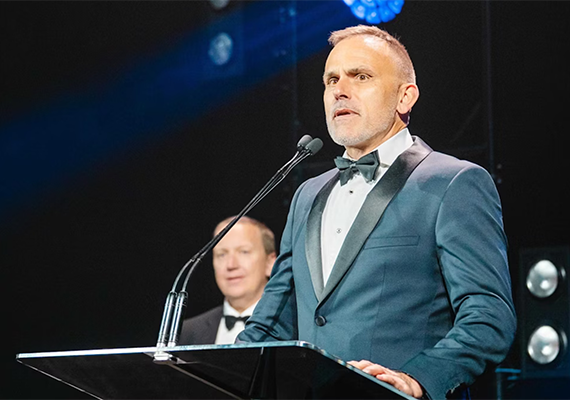
Great medical ideas can come from the most unlikely places – such as a grandmother on a farm using a skateboard to rehabilitate after major knee surgery.
Dr Matthew Liptak (BM, BS ’96), who graduated from Flinders University in 1996 and became a Fellow of the Royal Australasian College of Surgeons (Orthopaedic Surgery) in 2007, seized on this peculiar idea to design a brilliant new medical device, MAXM Skate, which is helping to speed patient rehabilitation after knee and hip replacement surgery.
This roller-skate-like device straps to the foot for easy and smooth movement, while inbuilt sensors measure the angles of the user’s knee while they are using the device. This data is sent to both the user’s smartphone and their clinician for monitoring.
This combination of both a tangible tool and a digital device has proved a winning formula, leading to the commercialisation of MAXM Skate and it now being sold in 23 countries.
“I was working at Portland Hospital in Western Victoria during 2012, and I noticed a grandmother whose rehabilitation from knee surgery was progressing much quicker than expected,” recalls Dr Liptak.
She wasn’t my patient, but I asked her what she was doing – and she explained that she was stuck out on her family farm without access to hospital rehabilitation services, so she strapped her grandson’s old skateboard under her foot and rolled it back and forth while she was sitting at the kitchen table.
“It was such a brilliant piece of ingenuity to improvise and achieve a terrific result, and it got me thinking that a more sophisticated version of this could provide an important breakthrough in rehabilitation after knee and hip surgery.
“To recover from a knee replacement, patients must perform rehabilitation exercises, but some don’t recover as quickly as others because they don’t stick to their motion and strengthening exercises. The MAXM skate makes it easier for them, reduces their pain during rehabilitation exercises and speeds their recovery.”
Dr Liptak created the company MAXM Skate to develop this innovative device, with help from Flinders University’s Medical Device Partnering Program (MDPP), which developed the skate and digital sensors inside the device, which measure the angles of the user’s knee movement and store this as digital data. Enabling patients to track their progress has been a great motivational tool to encourage perseverance with rehabilitation.
“The results have proven that outcomes are exceptional – and more far-reaching than we expected. For instance, people who used MAXM Skate regained normal movement more quickly, suffered two time less depression than other people going through rehabilitation, and had significantly reduced pain,” says Dr Liptak.
Dr Liptak has long been a high achiever, having also enjoyed a career as an elite AFL footballer, playing nine seasons with the Adelaide Crows – while he simultaneously juggled many years of medical studies, and work as an orthopaedic surgeon after graduating.
“Going to university at a very young age, starting my studies at 16, I had initially thought that a doctor simply focused on broken bone/fix bone, so it soon became clear that I had a lot to learn, while I was simultaneously putting so much into sport. I did defer studies because I wasn’t aware of where I was going at that stage,” says Dr Liptak. “Perspective came with time, and I really enjoyed combining both medicine and football, because I love effective time management skills, which have continued to shape my career.”
His fight to overcome significant soft tissue injuries in the later part of his football career – he remembers playing only 13 games in his final three years with the Adelaide Crows – led Dr Liptak to share greater empathy with his patients trying to recover from surgery. “It’s important to be able to acknowledge the pathways that patients go through. Rehabilitation is all about promoting movement, then strength, then function – and I know that from personal experience.”
Since graduating from Flinders, Dr Liptak has become a prominent Adelaide orthopaedic surgeon, building a career based on best outcomes for patients. He specialises in knee arthroplasty and sports injuries, with research also being a prominent part of his portfolio. He is a member of The Australian Knee Society and has been innovative in providing medical audiences’ access to live surgery viewed digitally – locally, nationally and internationally.
The capabilities of MAXM Skate are now being pushed further, with Flinders PhD student Alicia Mitchell investigating how AI can further enhance motion sensor accuracy and predict rehabilitation progress.
“This idea continues to move forward,” says Dr Liptak.
“Patients get it and doctors get it, health stakeholders get it, but disrupting set rehabilitation behaviours is a big challenge to work through. Beyond this, we are very confident for the future because we know this product, which improves patient outcomes so significantly, is a winning formula.”

